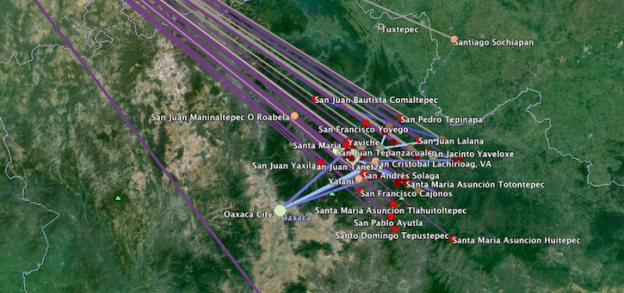About a year ago, I became interested in mapping as a research tool. Since then, I have met and talked to many other graduate students, professors, and researchers who work on amazing projects. We shared ideas, plans, (and beers), and talked about difficulties and problems we encountered in our work.
There are so many interesting projects out there (some already published online, some still under construction on private PCs). There are also dozens of helpful articles about theory and methodology. But it is not often that a published project also comes with a supporting scholarly article on methods.
In this blog post, I want to introduce interested folks to the “Power of Attorney” digital research project, which combines a completed online visualization of the project with a recently published essay on methodology and theory by the project’s creator Dr. Yanna Yannakakis.
The website for “Power of Attorney” provides an interactive visualization of indigenous legal culture in colonial Mexico through the axes of people, space, time, and legal activity.Combining ethnohistory, social history, and spatial history, this project contributes to interdisciplinary scholarship on indigenous legal cultures and colonial societies in Latin America. Dr. Yannakakis’ goal is to show how native people interacted with the law across geographical expanses and differences of language and culture.
“The website maps relationships among people, places, and courts created by a common notarial procedure: the granting of power of attorney. The maps and visualizations draw their data from letters of attorney produced during the eighteenth century in the district seats of two of New Spain’s largest indigenous jurisdictions: Villa Alta and Teposcolula. The relationship between indigenous litigants and their legal agents created social networks and flows of knowledge and power at a variety of scales, some local and some transatlantic, whose dimensions changed over time.
Through maps, Gephi models, and narrative sections, the website provides an at-a-glance overview of the spatial and social connections among Indian towns, ecclesiastical and viceregal courts, and the court of the king in Madrid from the perspective of an indigenous region rather than a top-down perspective.
The maps allow researchers to see each authorization of power of attorney as a web of relationships among people, places, and institutions in which patterns emerge and individual connections stand out. In this regard, the maps are a tool as much as an end: they allow us to see data in a new way, and to ask questions that send us back to the archive to reconstruct the stories within the maps.
By expressing relationships forged by power of attorney spatially, we get a bird’s eye view of flows of power, knowledge, and resources among native villages, legal professionals, and legal institutions. Indigenous people gave power of attorney to legal agents in their own communities, larger Indian towns that were parish seats, the district seat of Villa Alta, the diocesan seat in Antequera/Oaxaca, the viceregal capital of Mexico City, and the court of the Spanish king in Madrid. Power of attorney allowed native people to engage in legal activity across wide expanses of space, which shaped colonial history in two broad ways. The first was that indigenous people could access the law to pursue local objectives, such as to host regional markets, claim a parcel of land that bordered a neighboring village, or achieve status as a parish seat; in short, they used Spanish courts and laws to their individual or collective advantage. The second effect of power of attorney was to incorporate native people into the institutional machinery of the empire, culturally, politically, and economically.”
(*project description taken partially from the Power of Attorney Website and edited for this blog post)
For the Power of Attorney (Oaxaca, Mexico) website:
https://www.powerofattorneynative.com
(If you can’t access the ORE article, there is also a (shorter) methodology section on the website).
For the article,Power of Attorney in the Oxford Research Encyclopedia:
Yannakakis, Yanna (2018): Digital Resources: Power of Attorney, A Digital Spatial History of Indigneous Legal Culture in Colonial Oaxaca, Mexico. Oxford Research Encyclopedia
To read this article, click here. (Unfortunately, the ORE article is behind a paywall).
